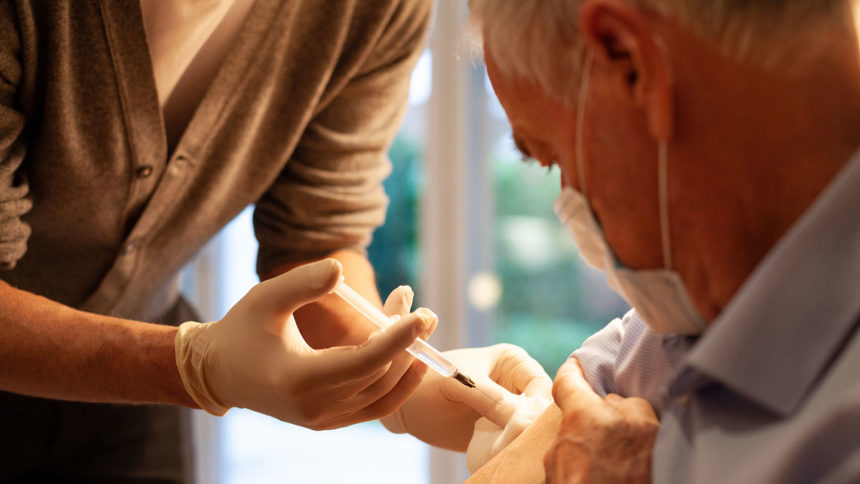
Two-thirds of older adults have not received a second COVID-19 booster vaccination and should do so as soon as possible, top federal health officials said Tuesday.
The SARS-CoV-2 omicron subvariant BA.5 is now responsible for 65% of COVID-19 infections in the United States, Ashish Jha, M.D., the White House’s COVID-19 response coordinator, told listeners in an online briefing. BA.5 and its BA.4 sister variant better evade immunity than earlier omicron variants and are behind an uptick in infections and hospitalizations.
COVID-19 hospitalizations have doubled since April, and although nowhere near the numbers experienced early in the pandemic, U.S. COVID-19 deaths number about 350 a day, Jha and his colleagues reported. COVID-19 cases have also increased in nursing homes. Resident infections, for example, have risen from about 2,400 reported the week of April 17, to more than 9,300 the week of July 3. The numbers are closely mirrored among nursing home staff members, according to the Centers for Disease Control and Prevention.
“It’s too high,” Jha said of the U.S. death tally. But “with every American doing their part, we can get through BA.5,” he added.
Don’t wait for omicron-specific shot
Jha directly addressed adults aged 50 years and older, asking them to get vaccinated or boosted if they haven’t yet had a shot this year, or if it has been five months since their last shot.
A second booster shot will provide a higher level of protection against the new omicron variants than a single shot will, added Rochelle Walensky, director of the Centers for Disease Control and Prevention. The latest data show that vaccinated people with a primary series of shots plus one booster dose had four times the risk of dying from COVID-19 than those with two or more booster doses, she reported.
The Food and Drug Administration, approved older adults for second booster shots in March. But only 34% of Americans aged 65 and older have received second booster doses.
“It’s essential that these Americans … get their second booster shot right away,” she said.
Walensky and Jha advised against counting on prior infection for protection or holding off on a booster shot until an omicron-specific vaccine is approved. Infection with an older omicron variant is not strongly protective against the newer omicron variants, they said. In addition, getting another shot now will not preclude recipients from receiving the variant-specific vaccines that are in development for the fall or winter, they added.
The Food and Drug Administration has encouraged drugmakers to speed development of omicron-variant-specific shots for the fall. Its vaccine advisers have said that older adults should likely be prioritized among the first recipients.
Infection uptick
The clinical severity of BA.4 and BA.5 in comparison to the other omicron subvariants is not yet known, officials said. But it is known that COVID-19 vaccines are highly protective against severe disease and death for other omicron subvariants and “likely also for Ba.4 and BA.5”, Walensky said. Staying up-to-date as recommended on vaccinations provides the best protection for severe outcomes, she said.
Jha also underscored the importance of testing before visiting people who are vulnerable to severe infection or large groups. In addition, he reminded operators of communal spaces about the effectiveness of good ventilation in stemming the spread of COVID-19.
Currently, 32% of the U.S. population is living in a community where COVID-19 infections are considered high based on federal data, the officials said. The federal strategy to tackle the challenges of new variants is to continue to provide “easy and convenient access” to infection control and treatment tools, Jha said.
Related articles:
Older adults top candidates for new COVID boosters this fall, FDA advisers say



